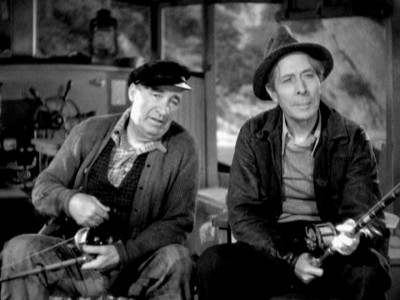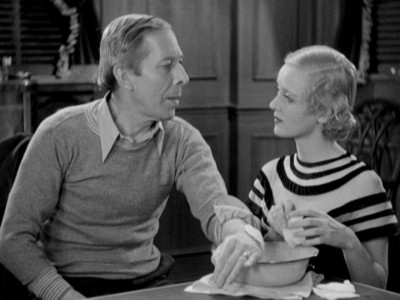
Early in 1932, George Arliss’ good friend Murray Kinnell was working on a low-budget thriller at Columbia called The Menace where he met and was so impressed by a young actress that he brought her to the attention of Arliss. The actress was Bette Davis, and Arliss immediately cast her in his The Man Who Played God (1932). The rest, as they say, is history — and Davis always credited Arliss for having made her career. For his part, Arliss was sufficiently impressed that he cast Davis again in The Working Man (1933), in which she would play a spoiled socialite whom Arliss takes under his wing (along with her spendthrift brother played by Hardie Albright) in an effort to straighten them out and save their inherited shoemaking fortune from an unscrupolous business manager.

This is one those delightful old confections where a rich industrialist (Arliss) pretends to be broke in order to do someone a good turn. (Yes, it’s a fantasy in that regard.) Actually, Arliss — whose company manufactures a competing line of footwear — has ulterior motives. Not only is he mourning the death of his old business rival, but he’s helping the children of the only woman he ever loved (and who married his rival). Moreover, he’s out to prove to his stiff-necked nephew (Hardie Albright) that he isn’t so old and out of date that he needs to be put out to pasture. The upshot is that he ends up running his late rival’s shoe factory and beating his nephew at his own game. Of course, it’s all rather silly, but endearingly so. We’re running it from a newly remastered copy that vastly improves on earlier versions.

The Working Man may be Arliss’ most completely accessible film for modern audiences — and these are very much his films. Oh, I know it says “Directed by John G. Adolfi,” but producer Darryl F. Zanuck afforded Arliss total autonomy in all matters — from the upholstery to the casting. He was even allowed to take his players and rehearse them as if they were performing a play (the audience made up of whoever on the Warner lot was free). Presumably Adolfi had something to say about where the camera was and what was done with it, but my guess is that old George had to OK it. Adolfi (who died this same year before their final film came out) must not have minded, because he made seven films with Arliss (this was his next to last).
The Asheville Film Society will screen The Working Man Tuesday, Feb. 25, at 8 p.m. in Theater Six at The Carolina Asheville and will be hosted by Xpress movie critics Ken Hanke and Justin Souther.




Before you comment
The comments section is here to provide a platform for civil dialogue on the issues we face together as a local community. Xpress is committed to offering this platform for all voices, but when the tone of the discussion gets nasty or strays off topic, we believe many people choose not to participate. Xpress editors are determined to moderate comments to ensure a constructive interchange is maintained. All comments judged not to be in keeping with the spirit of civil discourse will be removed and repeat violators will be banned. See here for our terms of service. Thank you for being part of this effort to promote respectful discussion.